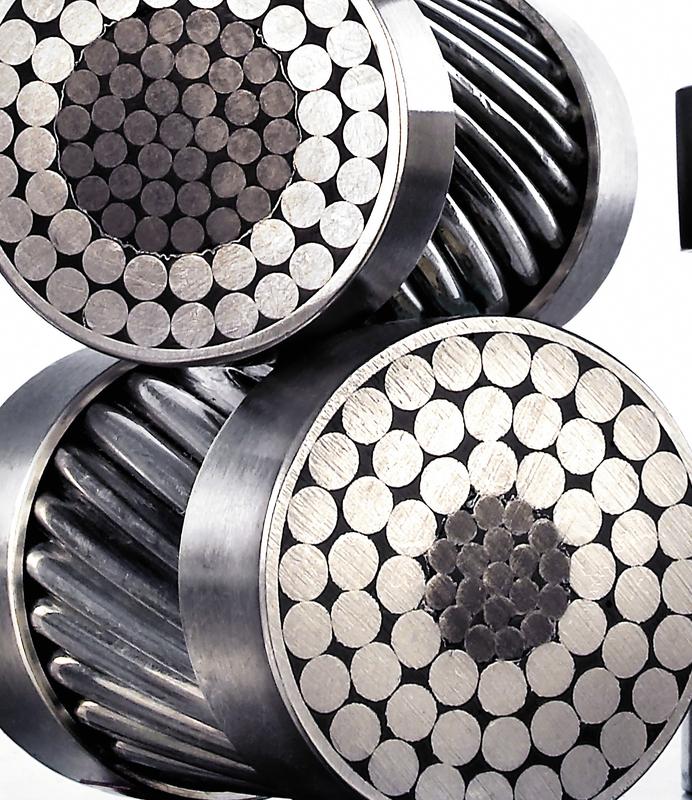Transporting more electricity through new lines

Both the wires in the core and the aluminium zirconium wires in the jacket contribute to the tensile strength. © 3M Deutschland GmbH
Greater utilisation of existing transmission lines
With an increasing current flow, overhead lines heat up as a result of the electrical resistance. Current transmission lines limit the long-range transport of short-term, regional electricity surpluses in the grid, as they are only designed for a maximum temperature of 80 °C.
The newly developed high-temperature conductor cables, on the other hand, can withstand temperatures of up to 210 °C. This makes it possible to transport greater amounts of electricity, thus preventing network congestion.
Inside the conductors, composite materials are used based on carbon fibres and aluminium ceramic as well as special aluminium and steel alloys. This has therefore solved the problem of greater sagging at higher temperatures, since the new transmission lines sag less than the previous ones.
The new high-temperature conductors can also increase the flexibility in the grid for short-term power peaks. By default, overhead lines are operated in Germany below the maximum possible capacity. The Institute for High Voltage Technology at RWTH Aachen University has conducted the research together with industrial partners.
You found all informations about the BINE Projektinfo brochure entitled “The hotline in the grid” here:
http://www.bine.info/en/publications/publikation/der-heisse-draht-im-netz/
Uwe Milles/Birgit Schneider
presse(at)bine.info
About BINE Information Service
Energy research for practical applications
The BINE Information Service reports on energy research topics, such as new materials, systems and components, as well as innovative concepts and methods. The knowledge gained is incorporated into the implementation of new technologies in practice, because first-rate information provides a basis for pioneering decisions, whether in the planning of energy-optimised buildings, increasing the efficiency of industrial processes, or integrating renewable energy sources into existing systems.
About FIZ Karlsruhe
FIZ Karlsruhe – Leibniz Institute for Information Infrastructure is a not-for-profit organization with the public mission to make sci-tech information from all over the world publicly available and to provide related services in order to support the national and international transfer of knowledge and the promotion of innovation.
Our business areas:
• STN International – the world’s leading online service for research and patent information in science and technology
• KnowEsis – innovative eScience solutions to support the process of research in all its stages, and throughout all scientific disciplines
• Databases and Information Services – Databases and science portals in mathematics, computer science, crystallography, chemistry, and energy technology
FIZ Karlsruhe is a member of the Leibniz Association (WGL) which consists of 87 German research and infrastructure institutions.
http://www.bine.info/en – BINE Informationsdienst
Media Contact
All latest news from the category: Power and Electrical Engineering
This topic covers issues related to energy generation, conversion, transportation and consumption and how the industry is addressing the challenge of energy efficiency in general.
innovations-report provides in-depth and informative reports and articles on subjects ranging from wind energy, fuel cell technology, solar energy, geothermal energy, petroleum, gas, nuclear engineering, alternative energy and energy efficiency to fusion, hydrogen and superconductor technologies.
Newest articles

First-of-its-kind study uses remote sensing to monitor plastic debris in rivers and lakes
Remote sensing creates a cost-effective solution to monitoring plastic pollution. A first-of-its-kind study from researchers at the University of Minnesota Twin Cities shows how remote sensing can help monitor and…

Laser-based artificial neuron mimics nerve cell functions at lightning speed
With a processing speed a billion times faster than nature, chip-based laser neuron could help advance AI tasks such as pattern recognition and sequence prediction. Researchers have developed a laser-based…

Optimising the processing of plastic waste
Just one look in the yellow bin reveals a colourful jumble of different types of plastic. However, the purer and more uniform plastic waste is, the easier it is to…



